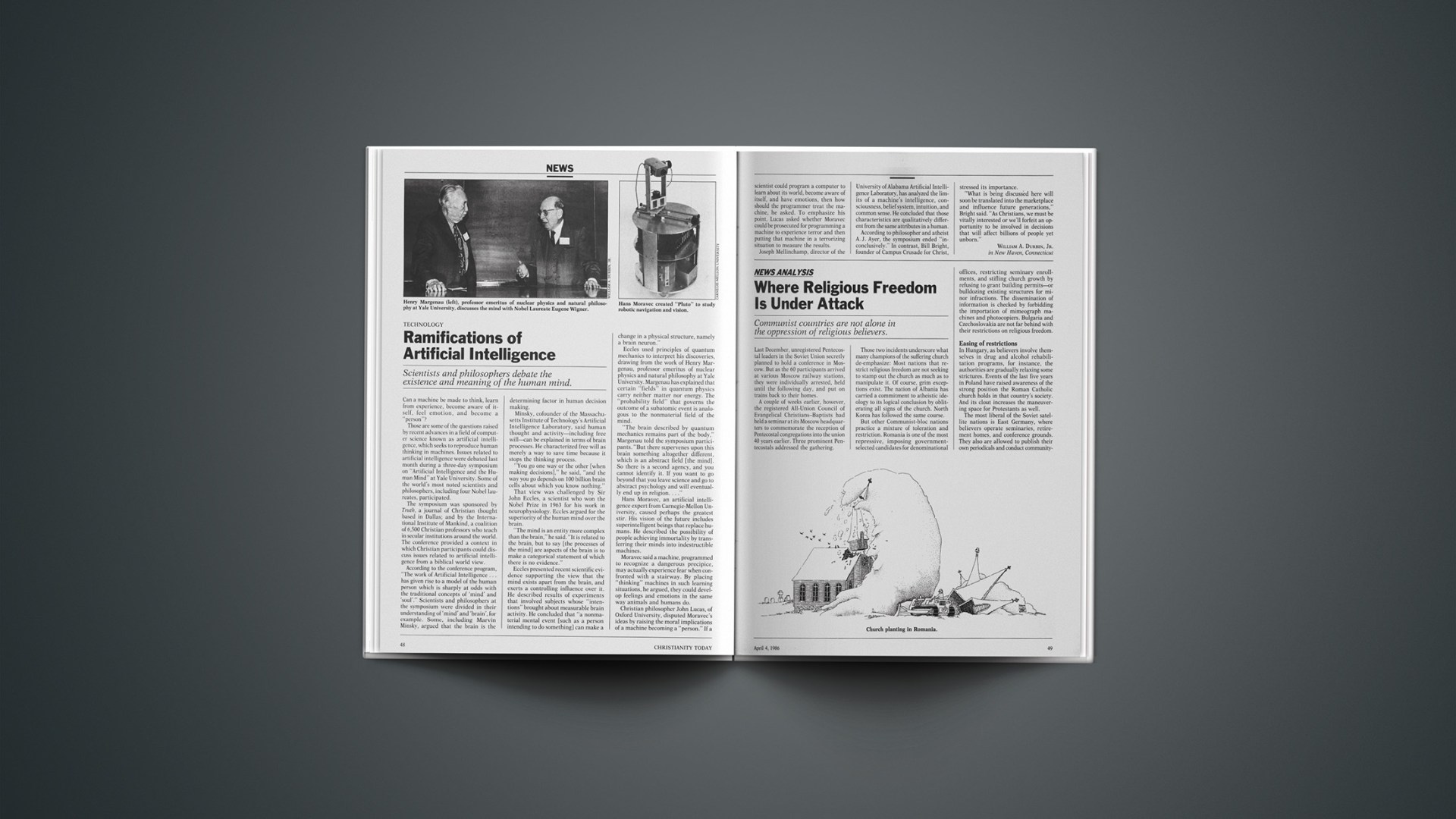Scientists and philosophers debate the existence and meaning of the human mind.
Can a machine be made to think, learn from experience, become aware of itself, feel emotion, and become a “person”?
Those are some of the questions raised by recent advances in a field of computer science known as artificial intelligence, which seeks to reproduce human thinking in machines. Issues related to artificial intelligence were debated last month during a three-day symposium on “Artificial Intelligence and the Human Mind” at Yale University. Some of the world’s most noted scientists and philosophers, including four Nobel laureates, participated.
The symposium was sponsored by Truth, a journal of Christian thought based in Dallas; and by the International Institute of Mankind, a coalition of 6,500 Christian professors who teach in secular institutions around the world. The conference provided a context in which Christian participants could discuss issues related to artificial intelligence from a biblical world view.
According to the conference program, “The work of Artificial Intelligence … has given rise to a model of the human person which is sharply at odds with the traditional concepts of ‘mind’ and ‘soul’.” Scientists and philosophers at the symposium were divided in their understanding of ‘mind’ and ‘brain’, for example. Some, including Marvin Minsky, argued that the brain is the determining factor in human decision making.
Minsky, cofounder of the Massachusetts Institute of Technology’s Artificial Intelligence Laboratory, said human thought and activity—including free will—can be explained in terms of brain processes. He characterized free will as merely a way to save time because it stops the thinking process.
“You go one way or the other [when making decisions],” he said, “and the way you go depends on 100 billion brain cells about which you know nothing.”
That view was challenged by Sir John Eccles, a scientist who won the Nobel Prize in 1963 for his work in neurophysiology. Eccles argued for the superiority of the human mind over the brain.
“The mind is an entity more complex than the brain,” he said. “It is related to the brain, but to say [the processes of the mind] are aspects of the brain is to make a categorical statement of which there is no evidence.”
Eccles presented recent scientific evidence supporting the view that the mind exists apart from the brain, and exerts a controlling influence over it. He described results of experiments that involved subjects whose “intentions” brought about measurable brain activity. He concluded that “a nonmaterial mental event [such as a person intending to do something] can make a change in a physical structure, namely a brain neuron.”
Eccles used principles of quantum mechanics to interpret his discoveries, drawing from the work of Henry Margenau, professor emeritus of nuclear physics and natural philosophy at Yale University. Margenau has explained that certain “fields” in quantum physics carry neither matter nor energy. The “probability field” that governs the outcome of a subatomic event is analogous to the nonmaterial field of the mind.
“The brain described by quantum mechanics remains part of the body,” Margenau told the symposium participants. “But there supervenes upon this brain something altogether different, which is an abstract field [the mind]. So there is a second agency, and you cannot identify it. If you want to go beyond that you leave science and go to abstract psychology and will eventually end up in religion.…”
Hans Moravec, an artificial intelligence expert from Carnegie-Mellon University, caused perhaps the greatest stir. His vision of the future includes superintelligent beings that replace humans. He described the possibility of people achieving immortality by transferring their minds into indestructible machines.
Moravec said a machine, programmed to recognize a dangerous precipice, may actually experience fear when confronted with a stairway. By placing “thinking” machines in such learning situations, he argued, they could develop feelings and emotions in the same way animals and humans do.
Christian philosopher John Lucas, of Oxford University, disputed Moravec’s ideas by raising the moral implications of a machine becoming a “person.” If a scientist could program a computer to learn about its world, become aware of itself, and have emotions, then how should the programmer treat the machine, he asked. To emphasize his point, Lucas asked whether Moravec could be prosecuted for programming a machine to experience terror and then putting that machine in a terrorizing situation to measure the results.
Joseph Mellinchamp, director of the University of Alabama Artificial Intelligence Laboratory, has analyzed the limits of a machine’s intelligence, consciousness, belief system, intuition, and common sense. He concluded that those characteristics are qualitatively different from the same attributes in a human.
According to philosopher and atheist A. J. Ayer, the symposium ended “inconclusively.” In contrast, Bill Bright, founder of Campus Crusade for Christ, stressed its importance.
“What is being discussed here will soon be translated into the marketplace and influence future generations,” Bright said. “As Christians, we must be vitally interested or we’ll forfeit an opportunity to be involved in decisions that will affect billions of people yet unborn.”
WILLIAM A. DURBIN, JR.
in New Haven, Connecticut










